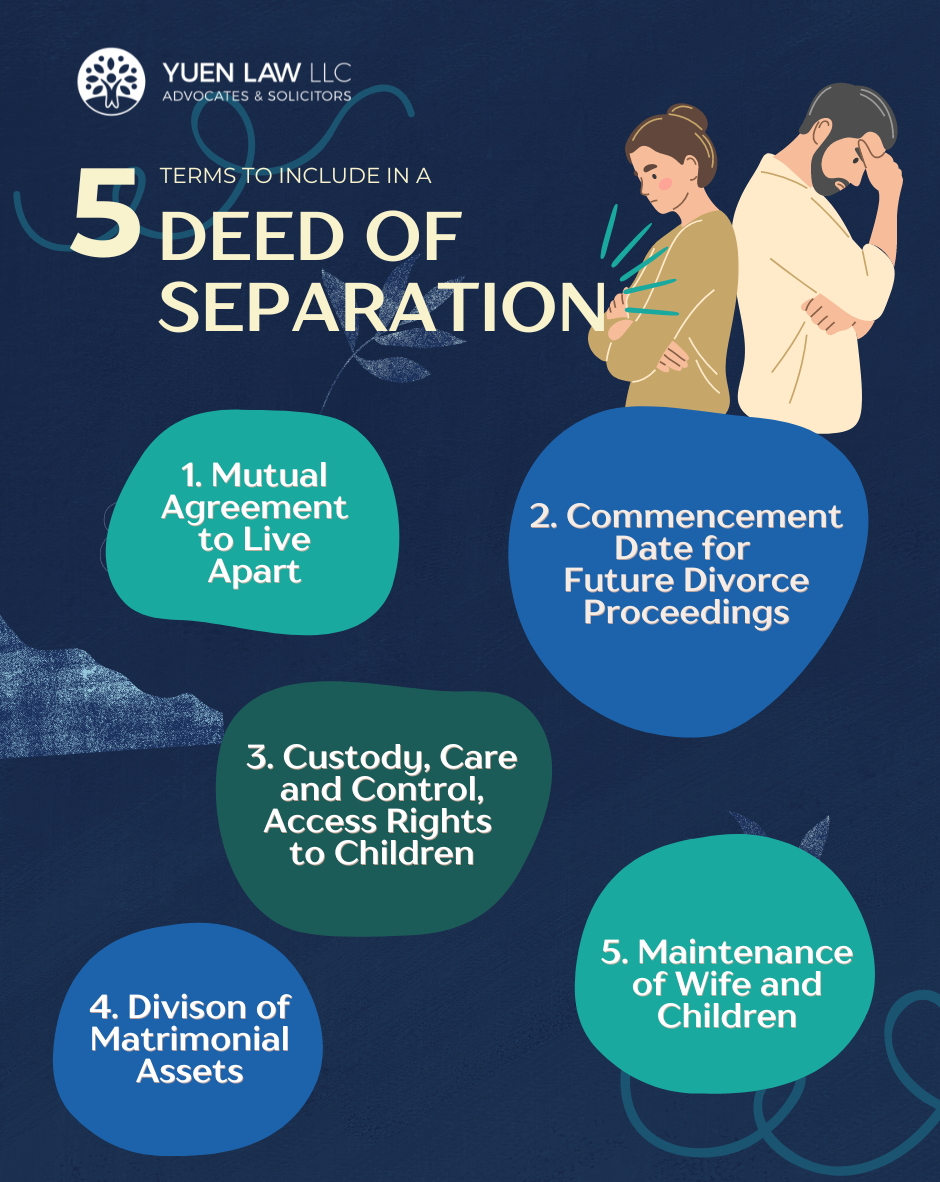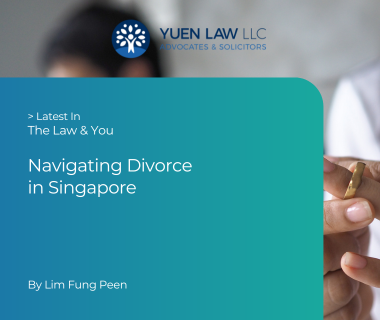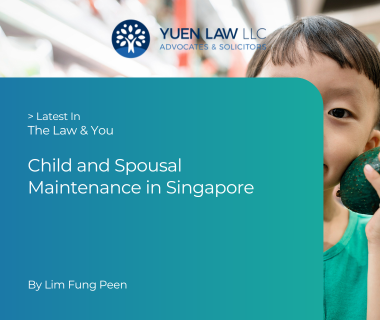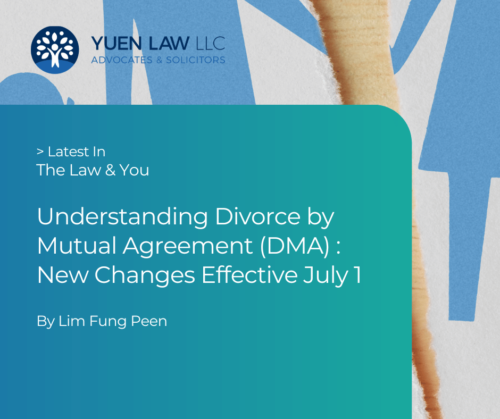Table of Contents

Deed of Separation: Should You and Your Spouse Consider It?
Legal separation, which entails living apart for three years with the spouse’s consent, is one of the recognized grounds for divorce in Singapore. Consequently, a Deed of Separation can serve as a vital instrument for addressing critical issues when a couple opts for a temporary or permanent separation. It is a private document between spouses.
A deed of separation may be a good option for you if you are going through tough times in your marriage and are unable to communicate with your spouse. For some, separation is a time out for parties to cool down and consider if they want to try to save the marriage. In such cases separation can help both spouses by giving them the much-needed space to collect themselves and work towards reconciling and rebuilding the marriage. They can also seek help from professional counsellors during this separation period to work out their problems in the marriage and to consider their options moving forward.
Not all separations lead to a divorce. Some couples use the period of separation to reconcile their differences. Separation is also a good option for couples who do not wish to divorce for moral, religious or practical reasons. For such cases, the type of separation is important so as to safeguard the interests of vulnerable persons e.g. young children or home-makers.
Why You Need a Deed of Separation
Divorces can become contentious, particularly when the parties involved disagree on the grounds for divorce, such as unreasonable behavior or adultery, or on the terms of the divorce, including matters related to children and the division of matrimonial assets. For example, if one spouse accuses the other of unreasonable behavior, the accused spouse will likely dispute these claims, presenting their own perspective. Even when couples agree on the reason for the divorce, disagreements often arise over these ancillary matters.
A Deed of Separation can help reduce tension by encouraging both parties to compromise and find common ground. It also provides clear documentation of the reasons for and terms of the divorce.
By establishing a period of three years of separation, which is a valid and non-fault-based ground for an uncontested divorce, a Deed of Separation can significantly lessen the unpleasantness often associated with “nasty” divorces. Below, we explore the requirements for separation and the advantages and disadvantages of having a Deed of Separation.
A Common Non-Fault Ground for Divorce in Singapore
3 years of Separation by Consent
To qualify for a divorce, the official term used for separation is “living apart”. Subject to the consent of both parties, the period of separation must be a minimum of 3 years under the Singapore divorce law. The test the Court uses is whether the parties have led separate lives i.e. they lived their own lives independently from each other and do not concern themselves with each other’s lives. A common evidence provided in the divorce papers is that the wife did not cook or clean for the husband or that the parties did not have meals together.
It is common for a couple to be separated but still live under the same roof. A common myth is that for separation to be effective or valid, the married couple must have lived at separate addresses. While living at separate addresses would certainly constitute separation, it need not be so. A married couple living under one roof but in separate bedrooms or separate sleeping arrangements would qualify if they indeed led separate lives in doing so.
It is also possible for a married couple to be separated even though they stay in the same bedroom. However, the Court would have to consider all the circumstances. Should you need advice on this matter, we will be able to provide you with the necessary legal advice.
Deed of Separation Explained
What is a Deed of Separation?
A Deed of Separation is a formal agreement that includes the terms of your separation and is recognised by the Singapore Family Court. It must be signed willingly by both parties. Usually, a lawyer will be appointed by one party to prepare it. The other party can choose to appoint his own lawyer if he feels that he requires legal advice before signing. Otherwise, the other party can be self-represented. The deed is not a court document, and will be kept by the parties and used when they want to apply for the divorce.
When Will You Need a Deed of Separation?
You could enter into a separation agreement verbally and mutually agree to live in separate rooms or separate addresses. But the problem with such “unofficial” type of separation could be that parties are not able to remember the commencement date of the separation given that it could continue for years. There could also be periods in between that parties decide to stay together and this could complicate matters.
If you are planning a separation and considering divorce as an option at a later time, you should ensure that the separation is done in a way that complies with the legal requirements necessary for a divorce in the Singapore Family Court.
What Terms are Included in a Deed of Separation?

Process of Drafting a Deed of Separation
A Deed of Separation is a valuable tool for couples undergoing an informal separation or judicial separation before finalizing their divorce. It provides a clear framework for managing ancillary matters, such as living arrangements, financial responsibilities, and the division of private properties and trust funds. By establishing these terms in advance, a Deed of Separation can help prevent disputes and minimize the likelihood of disagreements during the separation period. It also offers clarity on the separation agreement, ensuring both parties are aligned before proceeding with divorce proceedings.
A basic deed of separation of separation will include the following terms:
- Confirmation that parties agree to live separately. Parties will also agree to not harass each other and that they are free to associate themselves with other persons.
- Sets the date for starting divorce proceedings.
- The custody, care and control and access rights to the children.
- The division of matrimonial assets.
- Maintenance for the children and wife.
While the Deed is a mutual agreement, the Singapore Family Court has the power to consider the fairness of the terms and vary them in the case that circumstances may have changed since it was signed. If the Court deems the terms unfair, it has the power to make orders and vary the Deed. However, it is unlikely that the Court will order that the entire Deed is unenforceable save for exceptional circumstances.
For a court to deem the deed of separation terms fair and justifiable in a divorce case, these terms must take into consideration the spouses’ standard of living, the extent of their contributions (including indirect contributions like caring for the family and property maintenance), as well as the rights, interests, and needs of any children involved.
A Deed of Separation typically includes a deadline by which the parties must decide whether to proceed with a divorce or continue with the separation. We can help create a comprehensive and customized Deed of Separation that protects your rights and interests throughout the separation process. It is common for a lawyer to be hired to draft the deed, ensuring all necessary terms are properly addressed.
Advantages and Disadvantages of a Deed of Separation
| What are the Advantages of a Deed of Separation | What are the Disadvantages of a Deed of Separation |
|---|---|
| It is a mutually agreed formal and “official” step to be separated. | The couple remain legally married. |
| It clarifies the start date of separation and earliest date to apply for divorce. | Parties cannot remarry during the period when they are still separated and not officially divorced. |
| Neither party can accuse the other of deserting or leaving the marriage unilaterally. | The couple needs to co-operate on matters relating to their children and matrimonial assets. |
| It gives parties time to work things out but have a deadline to commence divorce. | Parties cannot apply for a new HDB flat. |
| It gives the couple time to wait things out, e.g., fulfilling the Housing and Development Board (“HDB”)’s requirement to stay in the flat for a Minimum Occupation Period before the flat can be sold, or waiting till their children are older. | |
| It fulfils the minimum 3-year separation to qualify for a divorce due to 3 years’ separation. |
This is a way to make your Deed of Separation official by way of a court order.
The process to apply for a judicial separation is similar to that of a divorce, except that in a judicial separation, the couple remains legally married. The advantage of a judicial separation is that the terms of the agreement are endorsed by the Court and will therefore be enforceable by a court order if one party breaches any of the terms.
Advantages and Disadvantages of a Judicial Separation
| Advantages of a Judicial Separation | Disadvantages of a Judicial Separation |
|---|---|
| It is a mutually agreed formal and “official” step to be separated. | The couple remain legally married. |
| It clarifies the start date of separation and earliest date to apply for divorce. | Parties cannot remarry during the period when they are still separated and not officially divorced. |
| Neither party can accuse the other of deserting or leaving the marriage unilaterally. | The couple needs to co-operate on matters relating to their children and matrimonial assets. |
| It gives parties time to work things out but have a deadline to commence divorce. | Parties cannot apply for a new HDB flat. |
| It gives the couple time to wait things out, e.g., fulfilling the Housing and Development Board (HDB)’s Minimum Occupation Period before the flat can be sold, or waiting till their children are older. | |
| It fulfils the minimum 3-year separation to qualify for a divorce due to 3 years’ separation. |
If one party does not comply with the terms of the court order, the other party is entitled to apply to Court to enforce it.
Judicial separation is also often chosen by couples who do not wish to be divorced because of moral or religious reasons.
Consequences of Judicial Separation
Since parties remain legally married, they will not be eligible to buy their own HDB flat. This may be a problem for some couples who wish to lead separate lives but are unable to purchase a separate HDB flat to move into in order to stay separated from their spouses.
A couple who is judicially separated is also not entitled to a share of his or her spouse’s assets if one of them dies without a will. It is therefore prudent for parties to do a Will and Lasting Power of Attorney. Please click here to read more about Will and LPAs.
A couple who wishes to get a divorce after obtaining a court order for judicial separation will still have to apply separately for a divorce as the final order for divorce may be different from the initial court order for judicial separation.
Importance of Consulting a Family Lawyer for Your Deed of Separation
In Singapore, separation is a legal ground for divorce, and formalizing it through a Deed of Separation can enhance the chances of achieving an amicable divorce settlement. This document, which outlines various terms like spousal and child support, child custody, and financial considerations, facilitates the early resolution of ancillary matters and reduces legal expenses in a divorce.
Given the significant implications of signing a Deed of Separation, it is advisable for all parties involved seek the assistance of an experienced family lawyer. Our legal experts can provide comprehensive explanations of the critical terms, ensuring that the Deed of Separation results in an effective settlement if the parties decide to pursue divorce based on separation grounds.






